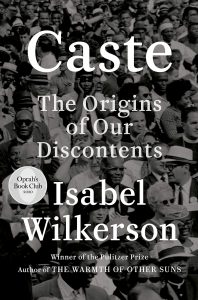Home » uncategorized (Page 2)
Category Archives: uncategorized
A Response to Caste by Isabelle Wilkerson
 By Mike Greenwood
By Mike Greenwood
Sometimes I can approach a book naively as I did with Isabelle Wilkerson’s Caste. As I reserved the book from my local library, I remember thinking that “caste” is something I know happens in India but here, where I live? No way. Little did I realize or anticipate that I would be challenged again and again with her provocative premise that there is an unspoken caste system in the United States of America.
Caste was not a comfortable read especially given I read it in the context of Black Lives Matter vigils and protests, the trials of police offers who were acquitted of killing black men and women, and the reckoning by a lot of white folks that we have ignored systematic racism in our institutions and policies.
In the context of this crisis, Isabel Wilkerson laid out a case for systematic classism by identifying eight underlying pillars of a caste system and using examples, often from her own life, of how they operated in Nazi Germany, in India and within the United States. Allow me to share two of the multitude of examples she provides in her 496-page book:
- Nazi Germany was looking internationally for laws to protect and promote the “superior” Aryan race, and identified an ideal model for their legal justification of bigotry and eventual killings – the United States of America and our Jim Crow laws. Wilkerson notes that even the German researchers from that time were “confounded by the lengths to which America went to segregate its population.”
- Alongside tracing the history of caste Wilkerson traces the notion of race, because, as she explains, race is about caste. “Race does the heavy lifting for a caste system that demands a means of human division. Until the birth of the new nation of The United States of America, no one had heard of the word ‘black’ as a race. No one in Africa. Everyone there is African.” She adds that when, “People do cruel things against a person of different colour for no other reason than the colour – that’s racism. People who do cruel things to others in order to ‘put them in their place’ – that’s casteism.”
At times, I thought Wilkerson dwelled too much on how Trump and Republican policies supported our caste system. But reflecting back on my reading of Caste, after the January 6th insurrection, I understand why she did. Many of those policies kept a small minority encased in power and influence through their status and wealth. Finally, several months after reading Caste, I continue to question much which I never questioned before – questions as to how our laws, polices and white supremacy all support the walls of our caste system.
One Congregation’s Response to Classism Workshops
By Michael Greenwood
Champlain Valley Unitarian Universalist Society, Middlebury, Vermont
During the years between 2015 and 2017, the Champlain Valley Unitarian Universalist Governing Board sponsored two Class Conversation workshops, “Organizing for Change: Addressing Classism In Your Faith Community” and “Create Justice- Not Walls: Class and Race in UU Settings.” Later, the congregation sponsored the worship service, Born on Third Base led by Chuck Collins author of the book of the same title.
As a result congregational members examined our policies, practices and norms. For example, from the minister to the sexton, we examined the equity of what we offered our employees. Were we equitable in our wages and more importantly the benefits we offered? Was “passing the plate” an embarrassing component of the Sunday service? We noticed who was missing at our events – pay for dinners, the auction- and wondered why.
During the years between 2015 and 2017, the Champlain Valley Unitarian Universalist Governing Board sponsored two Class Conversation workshops, “Organizing for Change: Addressing Classism In Your Faith Community” and “Create Justice- Not Walls: Class and Race in UU Settings.” Later, the congregation sponsored the worship service, Born on Third Base led by Chuck Collins author of the book of the same title.
In response, our minister Barnaby Feder with other key individuals in the congregation instituted the following changes.
- We made childcare an integral offering for every committee and small group meeting thus enabling single parents and families to attend without having to worry about providing childcare. This allowed them to participate in our congregational life outside of Sunday service.
- We shared our personal stories from the pulpit of how we had moved from one class background to another e.g. working to professional middle class or vice-versa from professional class to working class. The sharing of these personal stories dispelled the myth that even though we are a largely affluent white congregation in a well respected liberal arts college town not all of us were professionals earning a comfortable income with generous benefits.
Because these stories were public, it created a culture of inclusion – “there is no shame to your economic status as others share that experience with you.”
- We moved away from charging and advertising discounts for families in order to attend communal meals and concerts. If a donation was needed to offset costs, a “free will” donation box was left to side of the entry door.
- Perhaps the most significant change we made was ending our annual auction fundraiser where the highest bidder wins. Instead we did a Radical Love Giveaways event. Raffle items were displayed on a table with a collection container where tickets could be deposited. Every family unit received 10 tickets to deposit wherever they wished – weekend vacations, dinners, a midnight snowshoeing event, a watercolor, etc. How did this event work as a fun-raiser? Participants were asked to give 4% of their annual pledge. But everyone received their 10 tickets and the equal chance of winning that dinner or weekend get-away regardless if they contributed that 4% or not.
To be sure our work has just begun. But I, along with many others, look forward to finding ways to be more inclusive as an integral part of our personal and spiritual growth.
Why I Volunteer
| By Elizabeth Cogliati
We don’t talk about money in this country enough. It is still a taboo topic. We also don’t talk about the ways in which money, and the lack thereof, affect people’s lives and their opportunities. Class is related to the cumulative effects of money and no money. We definitely do not talk enough about class, and how it affects people’s experiences of Unitarian Universalism. I want to encourage all of us to talk more about class, and money, and the effects they have on our congregants and our congregations. I think it is especially important to discuss this from a young age, and incorporate it into our religious education classes for children and youth. |
Class and Race
By Nancy Hilliard
As we move forward from this momentous springtime 2020, from, with the novel coronavirus and massive protests of the murder of black men and women, we need to keep in mind the consequences of racism in every context. Not surprisingly, poor people with fewer healthcare options are being hard hit by the novel coronavirus, far beyond the impact proportional to their numbers. However, even with limited accounting, the novel coronavirus is killing Black Americans at almost 3 times the rate of white Americans across the socio-economic spectrum. Black Americans have a shorter lifespan than White Americans with less than a high school education—even when they hold graduate degrees. Black Americans receive all the disadvantages of classism, and the healthcare gap continues up the class ladder; They receive none of the health advantages bestowed upon White Americans in the upper classes.
We are challenged to consider racism as it affects all of us, and as it intersects with class. Within the context of racism, classism is experienced and felt differently by people of color than by white people. I used to think that poor white people who argued that white privilege didn’t exist for them were merely ungrateful, certainly unaware. In a conversation with my nephew, he persisted in his description of poor people with mental health issues living on the streets, not enjoying any privilege whatsoever. I realized that perhaps the only privilege they did have was knowing they could walk to the corner store and back without being shot in the back or choked to death by police. And until recently, I had not been aware of how prevalent that risk of death is for so many in our communities even as I considered myself to be well-informed.
This short-sightedness has corrupted my understanding of classism; just as I have been dismissive of those in poorer classes who won’t see their white privilege, I have discounted hardship that is real for people of color in the wealthier classes. I find I have bought into the race-based explanation for class in the United States to a greater extent than I knew. I must catch and stop the thoughts that white people who are poor should work harder and look for those missed opportunities. I am also vulnerable to thoughts that people of color who have reached the middle and upper classes must have escaped the ravages of racism to a significant extent. It is easy to fall into the simplistic explanations that comfort those who enjoy the status quo. I am being disabused of these notions this season of COVID, this summer of rising awareness and the Wall of Moms.
We must keep learning about our world.
There have been eloquent personal blogs about being the Black Best Friend, and there has been much written in academic circles. The commentary of several leaders has been available recently, such as the writings of Michelle Alexander, author and visiting professor at Union Theological Seminary (New York City); the allegories of Dr. C Jones Camara Phyllis Jones of Emory and Morehouse School of Medicine; the words of David R. Williams of Harvard T.H. Chan School of Public Health; the prolific writings of Ibram X. Kendi. All call us to review our preconceptions and misconceptions about how classism works in the United States of America, and how the profitability of racism has molded our classist system.

